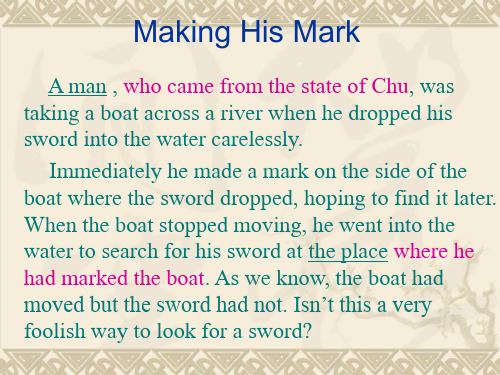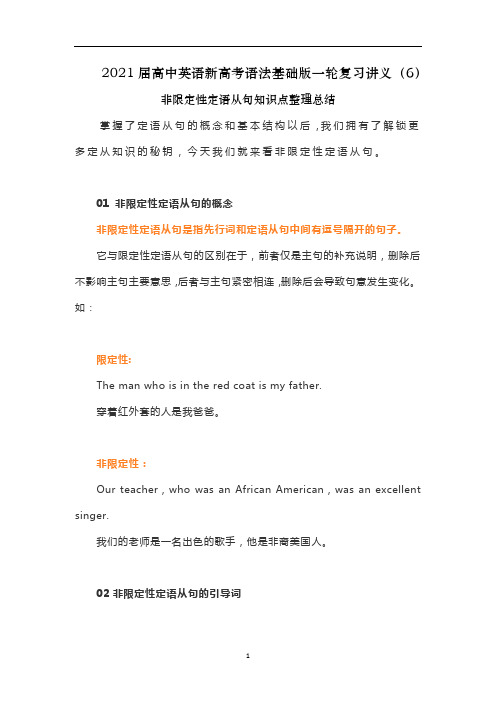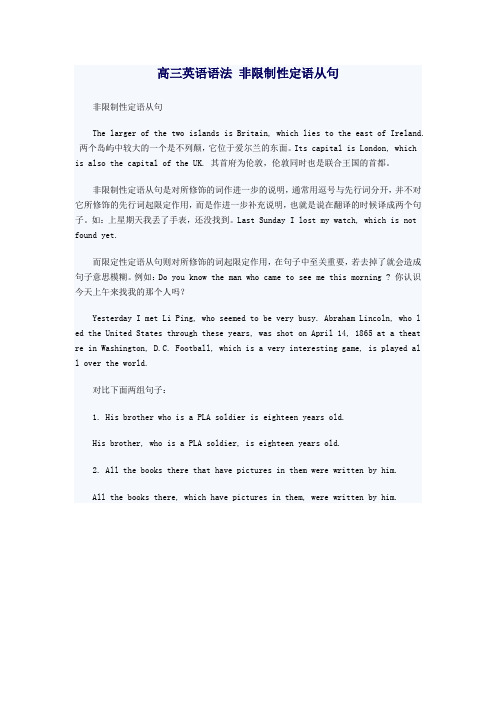(完整版)高中英语非限定性定语从句语法归纳
- 格式:docx
- 大小:16.69 KB
- 文档页数:5

语法解析与实例非限制性定语从句的修饰词非限制性定语从句是英语语法中的一种修饰结构,常常用于修饰一个名词或代词,对其进行进一步的解释或说明。
与限制性定语从句不同的是,非限制性定语从句不会改变主句的整体语义,通常用逗号将其与主句分隔开来。
本文将对非限制性定语从句的语法特点进行解析,并举例说明其用法。
一、非限制性定语从句的特点非限制性定语从句通常由关系代词或关系副词引导,一般放在被修饰词后面,并用逗号与主句隔开。
具体特点如下:1. 不限制被修饰词的范围:非限制性定语从句并不限定被修饰词的范围,一般用来提供额外信息或进行补充说明。
2. 不改变主句的整体语义:与限制性定语从句不同,非限制性定语从句不改变主句的整体意思,即使去掉非限制性定语从句,主句仍然可以独立成立。
3. 措辞较为随意:非限制性定语从句的表达通常比较自由,不像限制性定语从句那样具有严格的语法要求。
二、非限制性定语从句的引导词非限制性定语从句通常由以下关系代词或关系副词引导:1. 关系代词:who, whom, whose, which, that等。
2. 关系副词:where, when, why等。
三、非限制性定语从句的用法实例1. 关系代词引导的非限制性定语从句:The professor, who is from a prestigious university, gave a wonderful lecture on biology.(这位教授来自一所知名大学,给我们做了一次精彩的生物学讲座。
)2. 关系副词引导的非限制性定语从句:I still remember the day when we first met.(我仍然记得我们初次见面的那一天。
)3. 非限制性定语从句的位置:His new car, which he bought last week, is very expensive.(他上周买的新车非常昂贵。
)需要注意的是,非限制性定语从句与限制性定语从句的区别在于语法结构和语义影响。


1 2021届高中英语新高考语法基础版一轮复习讲义(6)非限定性定语从句知识点整理总结 掌握了定语从句的概念和基本结构以后,我们拥有了解锁更多定从知识的秘钥,今天我们就来看非限定性定语从句。
01 非限定性定语从句的概念 非限定性定语从句是指先行词和定语从句中间有逗号隔开的句子。 它与限定性定语从句的区别在于,前者仅是主句的补充说明,删除后不影响主句主要意思,后者与主句紧密相连,删除后会导致句意发生变化。如:
限定性: The man who is in the red coat is my father. 穿着红外套的人是我爸爸。
非限定性: Our teacher,who was an African American,was an excellent singer. 我们的老师是一名出色的歌手,他是非裔美国人。
02 非限定性定语从句的引导词 2
非限定性、限定性定语从句的关系代词基本一致,主要区别在于前者不能用that。 和限定性定从一样,二者指人时要都要用who/whom/whose;指物或句子成分时用which/as。 非限定性、限定性定语从句的关系副词也基本一致,仍然用when/where/why或介词+which结构;要注意的是,非限定定从中不能用that来替换介词+which。 除了which和新引导词as以外,其他引导词在两类定语从句中区别不大;因此,今天我们就重点来看区别较大的which和as。
03 which在“非限”定从中的用法 which在“非限”定从中,其先行词不仅可以是名词或代词,也可以是形容词、短语、从句或整句话,这是其与限定性定从最大的区别。
先行词是名词或代词,which在从句中做主语、宾语或表语 这种情况下和其在限定性定从中用法类似。如: Oil, which is a kind of liquid, is very important in daily life. 石油,是一种液体,在生活中非常重要。

高三英语语法非限制性定语从句非限制性定语从句The larger of the two islands is Britain, which lies to the east of Ireland.两个岛屿中较大的一个是不列颠,它位于爱尔兰的东面。
Its capital is London, which is also the capital of the UK. 其首府为伦敦,伦敦同时也是联合王国的首都。
非限制性定语从句是对所修饰的词作进一步的说明,通常用逗号与先行词分开,并不对它所修饰的先行词起限定作用,而是作进一步补充说明,也就是说在翻译的时候译成两个句子。
如:上星期天我丢了手表,还没找到。
Last Sunday I lost my watch, which is not found yet.而限定性定语从句则对所修饰的词起限定作用,在句子中至关重要,若去掉了就会造成句子意思模糊。
例如:Do you know the man who came to see me this morning ? 你认识今天上午来找我的那个人吗?Yesterday I met Li Ping, who seemed to be very busy. Abraham Lincoln, who l ed the United States through these years, was shot on April 14, 1865 at a theat re in Washington, D.C. Football, which is a very interesting game, is played al l over the world.对比下面两组句子:1. His brother who is a PLA soldier is eighteen years old.His brother, who is a PLA soldier, is eighteen years old.2. All the books there that have pictures in them were written by him.All the books there, which have pictures in them, were written by him.。

英语语法限制性定语从句和非限制性定语从句用法与区别在英语语法中,定语从句(Relative Clauses)扮演着非常重要的角色。
其中,限制性定语从句(Restrictive Relative Clauses)和非限制性定语从句(Non-restrictive Relative Clauses)是两种常用的定语从句类型。
它们的用法和结构有所不同,本文将详细介绍限制性定语从句和非限制性定语从句的使用方法及区别。
一、限制性定语从句的用法与结构限制性定语从句用于限制或界定先行词的范围,如果去掉它,主句的意思就不完整或含义发生改变。
常用关系代词有that, who, whom, whose, which, where, when等。
限制性定语从句的结构是:关系代词/关系副词 + 主语 + 谓语。
例句1:The book that you lent me is very interesting.例句2:I know a girl who speaks three languages fluently.二、非限制性定语从句的用法与结构非限制性定语从句是对先行词进行附加说明或解释,不对先行词进行限制或界定。
这种定语从句在句子中起到进一步补充和说明的作用。
非限制性定语从句用逗号隔开,不可以用关系代词that,只能用which, who, whom, whose, where, when等。
非限制性定语从句的结构是:关系代词/关系副词 + 主语 + 谓语 + 逗号.例句1:My brother, who is a doctor, lives in London.例句2:The Eiffel Tower, which is located in Paris, is a famous landmark.三、限制性定语从句与非限制性定语从句的区别1. 逗号的使用:限制性定语从句不使用逗号与主句分开,而非限制性定语从句使用逗号与主句隔开。

非限制定语从句
定语从句分为限制性定语和非限制性定语从句,非限制性定语从句在句中主要起补充说明作用,与主句之间往往有逗号隔开,独立存在,确实也不会影响整个句子的意思。
1.who引导的非限制性定语从句
who引导的非限定性定语从句在句中作从句的主语。
eg. Our guide,who was a French Canadian,was an excellent cook.
2. whom引导的非限制性定语从句
关系代词whom用于指人,在句中作动词宾语和介词宾语,作介词宾语时,介词可位于句末。
eg.Peter, whom you met in London, is now back in Paris.
3.whose引导的非限制性定语从句
whose是关系代词who的所有格形式,在从句中作定语。
whose通常指人,也可指动物或无生命的事物。
eg.The boy, whose hat is red, studies very hard.
4.when引导的非限制性定语从句
关系副词when在非限制性定语从句中作时间状语,指代主句中表示时间的词语。
eg.He will come here yesterday, when he will be free.
5.where引导的非限制性定语从句关系
副词where在非限制性定语从句中作地点状语,指代主句中表示地点的词语。
eg.They went back to London,where was their hometown.。
考点六十九非限定性定语从句考向一非限制性定语从句非限制性定语从句是对意义已经非常明确的先行词给予补充、说明,删去非限制性定语从句,主句的意思仍是概念清晰、结构完整的。
非限制性定语从句的引导词有who,whom,which,whose,as,when,where等,that不可用于引导非限制性定语从句,从句之前要用逗号。
先行词指人,则用who,whose,which等;先行词指物,要用which;先行词表时间或者地点,并在句中作时间状语或者地点状语时要用when或者where引导。
一、使用非限制性定语从句的情况:1. 关系代词指代整个主句时,使用非限制性定语从句。
☛You did a lot for me, for which I was grateful. 你为我做了许多,对此我很感激。
☛The Diaoyu Island belongs to China, as is known to us. 众所周知,钓鱼岛属于中国。
☛A middle-aged woman killed her husband, which frightened me very much. 一个中年女子杀害了自己的丈夫,这令我十分恐惧。
2. 当先行词指的是世界上独一无二的事物或人名地名等专有名词时,使用非限制性定语从句。
☛China, which is my motherland, is developing fast. 中国是我的祖国,正在快速发展。
☛Eason, who was a pop star, got married last year. 伊森去年结婚了,他是明星。
☛Last Sunday they reached Nanjing , where a conference was to be held. 他们上周日到达南京,有个会议要在那里举行。
3. 当先行词指的是某人只有一个亲属(son,daughter等)时,使用非限制性定语从句。
非限制性定语从句知识点总结非限制性定语从句是英语语法中的一种重要句子结构,用来修饰主句中的名词或代词,进一步说明其前面的名词或代词的特点、性质、状态等。
相对于限制性定语从句,非限制性定语从句在语法结构和用法方面略有不同。
本文将对非限制性定语从句的使用、结构和注意事项进行总结。
一、非限制性定语从句的使用场景非限制性定语从句通常用来对主句中的名词或代词进行补充说明,起到进一步修饰的作用。
非限制性定语从句并不是主句中名词或代词的必需部分,即使去掉非限制性定语从句,主句的意思仍然完整。
例如:1. My friend, who is a doctor, is coming to visit me tomorrow.(我的朋友,他是一名医生,明天要来看我。
)2. The Taj Mahal, which is located in India, is a world-famous tourist attraction.(泰姬陵,位于印度的一座世界著名旅游景点。
)二、非限制性定语从句的基本结构非限制性定语从句通常由关系代词或关系副词引导,引导词可用于引导主语、宾语、表语等不同的成分。
关系代词引导非限制性定语从句的常见单词有:who, whom, whose, which, that;关系副词引导非限制性定语从句的常见单词有:when, where, why。
例如:1. My brother, who is a teacher, lives in London.(我的弟弟,他是一名教师,住在伦敦。
)2. I visited the school where my mother used to study.(我参观了我母亲曾经就读的学校。
)三、非限制性定语从句的注意事项1. 非限制性定语从句和主句之间用逗号或句号隔开,逗号用于较短的非限制性定语从句,句号用于较长的非限制性定语从句。
2. 非限制性定语从句中的谓语动词可以有主谓一致的变化,而限制性定语从句中的谓语动词是不可省略的。
1 非限定性定语从句是英语语法中从句的一种, 是定语从句的分支之一。 作用是对所修饰的成 分作进一步说明,通常和主句间用逗号隔开,将从句拿掉后其他部分仍可成立。 运用非限定 性定语从句,尤其要注意其语法运用及其所表示的东西。 1 who引导的非限制性定语从句 Our guide,who was a French Canadian,was an excellent cook. 我们的向导,一个法裔加拿大人,擅长于烹调。 My gardener, who is very pessimistic, says that there will be no apples this year.
我家的园丁非常悲观,他说今年将不结苹果。 2 whom引导的非限制性定语从句。
关系代词whom用于指人,在句中作动词宾语和介词宾语, 作介词宾语时,介词可位于 句末。 如: Peter, whom you met in London, is now back in Paris. 彼得现在回巴黎了,你在伦敦见过他。 Mr Smith, from whom I have learned a lot, is a famous scientist.
史密斯先生是一位著名的科学家,我从他那儿学了许多东西。 3 whose引导的非限制性定语从句。 whose是关系代词 who的所有格形式,在从句中作定语。 whose通常指人,也可指动物
或无生命的事物。 如: The boy, whose father is an engineer, studies very hard. 那位小男孩学习很努力,他的父亲是位工程师。 Above the trees are the mountains, whose magnificence the river faithfully reflects on the surface.
在树林的高处是山,其壮丽的景色完全映照在河面上。 The play,whose style is rigidly formal ,is typical of the period.
这剧本是那个时期的典型作品,风格拘谨刻板。 4 which引导的非限制性定语从句。
关系代词which在非限制性定语从句中所指代和修饰的可以是主句中的名词、形容词、 短语、其他从句或整个主句,在从句中作主语、动词宾语、介词宾语或表语。 ① which指代主句中的名词,被指代的名词包括表示物、婴儿或动物的名词、表示单 数意义的集体名词以及表示职业、品格等的名词。 女口: These apple trees, which I planted three years ago, have not borne any fruit. 这些苹果树是我三年前栽的,还没有结过果实。 She is an artist, which I am not.
她是一位艺术家,而我不是。 Water, which is a clear liquid , has many uses.
水是一种清澈的液体,有许多用途。 The two policemen were completely trusted , which in fact they were.
那两个警察完全受到信任,事实上,也真是如此。 2
② which指代主句中的形容词。 如: She was very patient towards the children, which her husband seldom was. 她对孩子们很耐心,她丈夫却很少这样。 She is always careless,which we should not be. 她总是马虎大意,我们可不应该这样。 ③ which指代主句中的某个从句。
如: He said that he had never seen her before, which was not true. 他说以前从没见过她,这不是真的。 ④ which 指代整个主句。 如: In the presence of so many people he was little tense, which was understandable. 在那么多人面前他有点紧张,这是可以理解的。 He may have acute appendicitis, in which case he will have to be operated on. 他可能得了急性盲肠炎,如果是这样,他就得动手术。 When deeply absorbed in work , which he often was ,he would forget all about eating and
sleeping. 他经常聚精会神地工作,这时他会废寝忘食。 5 when 引导的非限制性定语从句。 关系副词 when 在非限制性定语从句中作时间状语,指代主句中表示时间的词语。 如: He will put off the picnic until May 1st, when he will be free. 他将把郊游推迟到 5 月 1 号,那时他将有空。 5.1 where 引导的非限制性定语从句关系。
副词 where 在非限制性定语从句中作地点状语,指代主句中表示地点的词语。 如: They went to London , where they lived for six months. 他们去了伦敦,在那儿呆了六个月的时间。 6 as 引导的非限制性定语从句。 as 引出非限定性定语从句时, 代替整个主句, 对其进行说明但通常用于像 as we all know, as it is known, as is known to all, as it is, as is said above, as always mentioned above, as is usual, as is often the case, as is reported in the newspaper等句式中。as在非限定性定语从句中作主语、 表语或宾语,且引出的从句位置比较灵活,可位于句首或句末,也可置于主句中间。通常均 由逗号将其与主句隔开。 as有 正如……,就像……”之意。 如: As is known to the United States, Mark Twain is a great American writer. 美国人都知道,马克吐温是一位伟大的美国作家。 (as在从句中作主语) He forgot to bring his pen with him, as was often the case.
他忘了带笔,这是常事。(as在从句中作主语) He is absorbed in work, as he often was.
他正在全神贯注地工作,他过去经常这样。 (as在从句中作表语) As we all know, the earth is round.
众所周知,地球是圆的。(as在从句中作宾语) The two brothers were satisfied with this decision , as was agreed beforehand.
两兄弟对此决定都满意,这项决定在事前都已得到他们的同意。 (as 在从句中作主语 ) Taiwan is, as you know, an inseparable part of China. 3
你知道,台湾是中国不可分割的一部分。 (as在从句中作宾语) “介词 +关系代词 ”引导的非限制性定语从句在介词后引导非限制性定语从句。 难:句意相同 as it is known to all (that...) (as 做状语从句连词,是状语从句 , 可以加 that) 与 as is known to all (as 做主语,是定语从句 ) 与 it is known to all that... ( 主语从句, it 是形式主语 ) 既: As is widely known, the moon is closer to the us than the sun.( 定从 )= Thatthe moon is closer to the us than the sun is widely known.( 主从 )= it is widely known thatthe moon is closer to the us tha n the sun.(主从)
As it is known to every on e, I thought you knew about it too.( 状从)[1] 关系代词which有时并不代表主句中某一确定的词, 而是概括整个主句的意思。 介词的 选择取决于它与先行词的搭配或与从句中谓语动词的搭配。 They were short of sticks to make frames for the climbing vines , without which the yield would be halved. 他们缺搭葡萄架的杆儿,没有它们产量会减少一半。 They thanked Tom,without whose support they would not have succeeded.
他们很感激Tom,没有他的支持他们是不会成功的。 6.1 名词 / 代词 +of+which / whom ” It now has 20, 000 hectares of land, more than two-thirds of which are under cultivation. 现在它拥有两万公顷土地,其中三分之二之多已经耕种。 Light is the fast thi ng in the world, the speed of which is 300000 kilometer per sec ond.
光是世界上最快的东西,它的速度是每秒 30万千米。 There are 30 chairs in the small hall, most of which are n ew. 大厅里有三十把椅子,绝大部分是新的。 The textile mill has over 8 , 000 workers and staff, eighty per cent of whom are women. 这家纺织厂有8千多职工,女职工占百分之八十。 7关系词 ①引导非限定性 定语从句的关系代词: